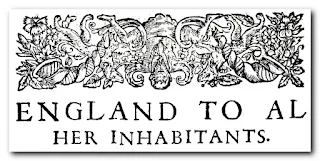P O L I M A N T E I A (4)
The author ?
...mine owne inhabitants did worke my ouerthrowe …
... banish without cause «..
.» for undoubtedly I had dyed but I was immortall...«
_________________
„W.C.“, the true author of „Polimanteia" (="multiple meanings")! can only have been, concealed Marlowe (alias Shakespeare) , if you take the entire context of the book into consideration.
_________________
In the second part of "Polimanteia",1595 ("ENGLAND TO ALL HER INHABITANTS") the author wrestles with his destiny.
He reveals himself as a highly sensitive, self-confident and educated artistic personality. The atmosphere is reminiscent in many passages to Shakespearean sonnets. He seems to cry out his fall and suffering his fate formally and denounces his own excessive and unjustified treatment.
Some excerpts:
»(…) my unsufferable & unpitied griefe, Modestie & Sobrietie are changed into all manner of dissolution.«
»(…) of the land, hath such as being displeased with mee, (…) it must needes happen that my joynts being racked with so great a torment, I live feeble, & confesse that mine owne inhabitants did worke my ouerthrowe (…)«
»(…) did I banish without cause, (…) to live distressed in a forraine countrie? did I hide nigardly the benefites of my peace, and plentie from them?«
»(…) When you shall finde they slander me but of inconstancie, your brethren of heresie, themselves of pitie and only to this end, the more easily to spoyle mee and the more deadly«
»(…) then seeing her [Elizabeth] to have such prerogative, finding to rule over so many subjects and fearing shee would banish me to haven, from whence I first came.«
»(…) Judge now, if ever creature of my innocencie and I may boldly stand to justifie my own integrity) hath had greater cause to complaine of wrong: more iust reason to suspect violence: & more true grounds of undoubted feare then I, that have sued?«
»(…) give me leave womanlike to complain (though hopelesse without reliefe) of wrongs offered to my person; instead of offering, I have suffered; instead of doing, I have receiued such manifest violence, such apparant wrongs, such secret disgraces, such open iniuries: as when I shall make report what I have indured for my names sake«
»(…) without houses, lands, or other obsessions, not retaining so much as the shadowe of a Common wealth since that I cruelly was banished from amongst them«
»(…) let the world iudge, if ever any receiued greater wrong, then I have suffered. (…) and to make me perish if it had been possible; (for vndoubtedly I had dyed but that I was immortall).«
»(…) from hence proceeded the fatall calamitie of my fortune: Councels against Councels: Confessions against Confessions; Accusations, Defences.«
»Banishments, and cruell Martyrdomes, Doe you heare and credit me, and yet for all this take me to have offered wrong & suffered none? Nay, when I (scarfull) had taken my selfe into the inner parts of Europe for feare of harme, then had I (in all likelihood) been banished from this Iland«
»(…) not to bee branded with so foule a shame; not to be noted with so blacke a marke; not to be called by so bad a name, have endavoured to signify their sinister practices by a good pretence, and have imployed such for the no idlenes, because all did labour: and are not the same banished from our land, howsoever procured by a better cause?«
If all historical and contemporary figures mentioned in "Polimanteia"(1595), all mythical or literary figures, all areas of knowledge and wisdom, all events and conflicts related to Marlowe/alias Shakespeare's work or life, are considered, it can safely be concluded that
Even if one picks out only the names of the characters, the references to Shakespeare plays (not yet written) such as "Caesar," "Pericles," "Henry VIII." "Antony and Cleopatra," "King Lear" , "Richard III." "The Tempest," "Lucretia [" Tarquin !] ") or to Marlowe-pieces (such as" Edward II/III." "Massacre of Paris," "Tamerlane " [Parthian], "Dido" [Carthage]), it seems virtually impossible, to consider these contexts as independent, accidental or random.....
Since "Stratfordian/Oxfordian/Oxfraudian" Shakespeare-Experts are not even ready to consider the possibility of a Marlowe/Shakespeare identity, they should at least be able to make a proposal of who else „W.C.“, the true author of „Polimanteia"(="multiple meanings")! might have been, taken the entire context of the book into consideration.
The author of "Polimanteia" and Shakespeare / Marlowe must have been one and the same (identical) person!
Even if one picks out only the names of the characters, the references to Shakespeare plays (not yet written) such as "Caesar," "Pericles," "Henry VIII." "Antony and Cleopatra," "King Lear" , "Richard III." "The Tempest," "Lucretia [" Tarquin !] ") or to Marlowe-pieces (such as" Edward II/III." "Massacre of Paris," "Tamerlane " [Parthian], "Dido" [Carthage]), it seems virtually impossible, to consider these contexts as independent, accidental or random.....
 |
| Excerpt of the Title page. whose fall of a coommonwealth you are asked to judge. |
———————————
VIDEOS – Complete Video Archive:
OPEN —> Heading--> Home -->Videos -- Shorts -- Posts
->Popular

